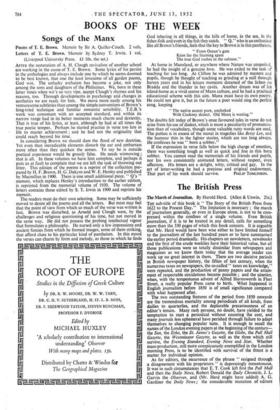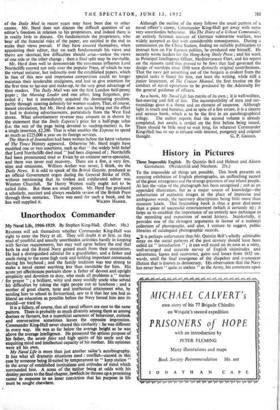The British Press
The March of Journalism. By Harold Herd. (Allen & Unwin. 21s.) THE sub-title of .this book is "The Story of the British.Press from 1622 to the Present Day." The limitation is necessary ; the march of journalism generally, or even in Europe alone, is not to be com- pressed within the confines of a single volume. Even British journalism, if it is to be treated in any detail, calls for something more than the 330 pages of which this book consists. It is arguable that Mr. Herd would have been wise either to have limited himself to the journalism of the last hundred years or to have summarised the earlier period drastically. His chapters on newsletters, newsboolcs and the first of the crude weeklies have their historical value, but all those publications were so totally dissimilar from newspapers and magazines as we know them today that the average reader can work up no great interest in them. There are two decisive periods in British newspaper history, the fifties of last century, when the numerous taxes on newspapers, the so-called" taxes on knowledge," were repealed, and the production of penny papers and the attain- ment of respectable circulations became possible ; and the nineties, when, with the tempestuous advent of Alfred Harmsworth in Fleet Street, a really popular Press came to birth. What happened in English journalism before 1850 is of small significance compared with what happened after.
The two outstanding features of the period from 1850 onwards are the tremendous mortality among periodicals of all kinds, from dailies to quarterlies, and the deplorable precariousness of an editor's tenure. Many rash persons, no doubt, have yielded to the temptation to start a periodical without counting the cost, and many journals less ephemeral have perished through failure to adapt themselves to changing popular taste. It is enough to recall the names of the London evening papers at the beginning of the century— the Sun, the Echo, the St. James's Gazette, the Globe, the Pall Mall Gazette, the Westminster Gazette, as well as the three which still survive, the Evening Standard, Evening News and Star. Whether mass-production, still more conspicuously exemplified in the London morning Press, is to be identified with survival of the fittest is a matter for individual opinion.
As for editors, the recurrence of the phrase "resigned through a disagreement with his proprietors" is depressingly monotonous. It was in such circumstances that E. T. Cook left first the Pall Mall and then the Daily News, Robert Donald the Daily Chronicle, J. L. Garvin the Observer, and (Mr. Herd might have added) A. G. Gardiner the Daily News; the considerable mutation of editors
of the Daily Mail in recent years may have been due to other causes. Mr. Herd does not discuss the difficult question of an editor's freedom in relation to his proprietors, and indeed there is in reality little to discuss. On fundamentals the proprietors, who bear all the financial risks of the paper, are entitled in the end to make their views prevail. If they have assured themselves, when appointing their editor, that on such fundamentals his views and theirs are identical, few difficulties should arise—unless the views of one side or the other change ; then a final split may be inevitable.
Mr. Herd does well to demonstrate the enoi mous influence Lord Northcliffe exerted not only over the popular Press, of which he was the virtual initiator, but indirectly over the established papers, which in face of this new and impetuous competition could no longer maintain their intolerable stodginess, and had to give attention for the first time to lay-out and make-up, to the very great advantage of their readers. The Daily Mail was not the first London half-penny paper ; the Morning Leader and one other, long forgotten, pre- ceded it ; but it immediately acquired the dominating position, partly through catering definitely for women readers. That, of course, meant circulation, but Mr. Herd does not quite bring out the effect it had in dratving advertisements, particularly from the West End stores. What advertisement revenue may amount to is shown by the statement that the Daily Express's price for a half-page solus (i.e. the rest of the page being devoted to reading-matter) is, for a single insertion, £2,200. That is what enables the Express to spend as much as £225,000 a year on its foreign services.
The March of Journalism had been written before the latest volumes of The Times History appeared. Otherwise Mr. Herd might have modified one or two assertions, such as that" the widely held belief that Lord Northcliffe died mad "had been disposed of ; Northcliffe had been pronounced mad at Evian by an eminent nerve-specialist, and there was never real recovery. There are a few, a very few, slips and omissions. William Archer was never, I think, on the Daily News. It is odd to speak of the British Gazette, produced as an official Government organ during the General Strike of 1926, without mentioning that its tireless and exhilarated editor was Winston Churchill. Sir Henry Wotton really ought not to be called John. But these are small points. Mr. Herd has produced a scholarly, succinct and always readable review of the British Press through three centuries. There was need for such a book, and he



































 Previous page
Previous page